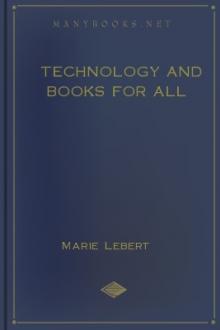Love for a Deaf Rebel, Derrick King [funny books to read .txt] 📗

- Author: Derrick King
- Performer: -
Book online «Love for a Deaf Rebel, Derrick King [funny books to read .txt] 📗». Author Derrick King
“I’m mad at Derrick for not taking more pictures. Always rushing! Never enough time.”
“True, because not enough money to have enough time.”
“Then the next time you ride south, I’ll arrange for you to buy half a kilo for twenty thousand. I’ll sell it for thirty-five thousand, and we’ll split the profit.”
“You’re kidding!”
He grinned. “I’m kidding. I never mix money and friendship.”
“Derrick showed me photos of your property.”
I had told Pearl about Snowslide, the home Virgil shared with Rhea, many times. His house was on the other side of a river and could not be seen from the road. His cablecar was the only way to reach it. When visiting, arranged by mail because there was no telephone, I would park next to his cablecar platform and honk the horn. Fifteen minutes later, I would see the cablecar rolling toward me like a flying surfboard as Virgil’s legs cranked its pedals. I would climb on, and we would roll back, five stories above the river, to the cablecar platform on the other side. From there, it was a short walk to his house in the forest. I can still taste the freshness of the air over the river. Ever since my first visit six years before, when Virgil lived in a cabin lit by kerosene lamps, I had dreamed of living on land like that. Virgil replaced his cabin with a two-story house when Rhea joined him. I loved it there, and I visited often.
“Snowslide is our playground. We cut our wood and heat our own house. We dam our creek and make our own power. We make our own mistakes, and we make a lot of love. A thousand feet of cable keeps it private. We got everything we need and nothing we don’t need. Derrick checked for me, with his detector.”
“What do you mean—‘checked with his detector?’”
“Virgil was afraid the police had hidden a microphone in his house, so I made a radio detector. Virgil brought me to his friend’s place to check his house, too.”
“Why was his friend worried?”
“Because he’s a marijuana farmer.”
“If you want to live a country life, you’ll have to decide while you’re young and strong. You got the brains. You just need the chutzpah and a dog.”
I sighed. “I need money. You need to be rich to avoid the madding crowd.”
“How to live without a job?” Pearl signed.
“You work for a bank—figure it out. You two are lucky to live in Canada, where there is plenty of land.”
When we told Virgil that our diving instructor refused to certify me, he said, “I’ll certify you both. I need a few students every year to maintain my instructor certification. You give me the fee, and I’ll mail you the forms. My name will be on them as a memento of the dives we never made.”
That was how Pearl and I became certified divers—certified by Virgil, who never saw us dive.
While I waited for the bus in the autumn rain, wearing a suit and overcoat, a woman tapped my elbow. She offered me a card with a jade-colored plastic talisman hanging from a key chain. The manual alphabet was printed on the card.
“Are you deaf?” I signed.
“Yes,” she signed, surprised.
“Why are you selling this?”
“I have no job.”
“Where are you from?”
“Toronto.”
“How long have you been in Vancouver?”
“Three months. Why can you sign?”
“Because my girlfriend is deaf.”
When I came home, for a joke, I opened the door, turned the light off and on, and stood in the hall as we had done at Elizabeth’s. I heard a click as Pearl locked the door. I unlocked it and walked in.
Pearl was furious. “Why did you do that?”
“A joke. Don’t deafies make jokes?”
“Never do that again! How can I know if a man is hiding here? Put a viewer in your door! A chain is not enough.”
“Sure. My joke was useful: you discovered my door has no viewer.”
While we ate dinner, I told Pearl about my bus-stop conversation.
“She should not sell those sign-language cards. She is begging! It makes hearies look down on deafies. Vancouver deafies hate it when Toronto deafies come here and sell those cards. If we see her, we will take her cards away, but if a man is selling them, we will hurt him. If you see her, tell her what I said.”
Again, Pearl had talked about violence toward men, but this time toward deaf men. I gave her the newspaper. “Read this. A man without arms wears his watch on his leg. He uses his feet to write and play the trombone. He visits schools to teach kids not to stare at handicapped people. Do deafies visit schools to teach kids not to stare at ASL?”
Pearl read the article. “No, but Sesame Street sometimes shows ASL.”
“Then write to the newspaper so hearies can hear a deaf story, too.”
“I will. Then you check my English.”
After dinner, Pearl wrote slowly, thinking about every word. She gave her draft to me. I only changed one word: fullyfilled to fulfilled. Her letter was published on 29 November 1984.
Editor, Vancouver Sun, Sir:
The Starers Have Real Problem
I have been deaf since I was born, so I read with great interest the article on your Sunday Kids Point page headlined ‘Better Armed than People Think’, which was devoted to letters from pupils at a Burnaby school who had been paid a visit by armless Alvin Law, who works for the Abilities Council.
One of the children who wrote pointed out that Law dislikes the words crippled, handicapped, and disabled. I agree with him that it is not he but the people who stare at him who have a problem.
During my childhood I thought normal people had no problem because they easily communicated with others. By the time I was 20 I realized that many of them had a problem worse than mine!
All of my life I have been able to use sign language to communicate with deafies, so to me it is the ‘normal’ people who keep staring at us who have the real problem.
I am no different from normal people except I don’t use my ears and voice to communicate. I can speak words—they sound muddy, but they are clear enough, I think.
It is the people who stare at me when I use a pen and paper to write to them or when I speak slowly to them who obviously have a problem, not me. My life is fulfilled.
Pearl
I was smitten by Pearl. Instead of saving my money for the future, I bought her a diamond ring and invited her to A Kettle of Fish, the best seafood restaurant in town, to give it to her.
“Do you know why we’re here?” I signed, after the waiter poured Canadian champagne. “Four reasons.”
“Christmas?”
“That’s one.”
“Birthday? This is my first birthday since we met.”
“That’s two.”
“To have dinner and talk about the year?” She blew a kiss. “Much has happened. Moving in, riding to Guatemala, diving lessons, signing, and so on. It has been a wonderful year. I love my feelings.”
“Yes, the third reason.”
“When my feelings are strong, I dream.”
“Dream about what?”
“A family, of course. I’m a woman. What do you dream about?”
“A house with land, of course. I’m a man.”
“A family needs a house, and a house needs a family.”
“I calculated how much we can afford: about $100,000.”
“Land is important for kids to grow up with a garden and animals.”
“Maybe our parents could help us with a down payment.”
“Mother refused to help when I bought my condo because her first down payment went to my husband when we divorced.”
“You are the sweetest and most interesting woman I ever met.”
Pearl smiled. “Also among hearing women?”
“I love your mind, and the rest, too. Do you think we are a good pair?”
Pearl nodded. “We are living happily. I believe the man must be here, and the woman must be here.” She held her hands face down, one above the other, and moved them in horizontal circles. “This doesn’t work.” She held her hands at the same level and bumped them together to show conflict. I want to be with you.”
I gave her a little box. “Then you will need this.”
Pearl opened it. “A ring!”
“Try it on.”
Pearl put the ring on her ring finger, past her chewed-off fingernails. “It fits. How did you know my size?”
“Because you tried on my engineer’s ring, the one I never wear.”
“Does this mean we are engaged?”
“Not yet because I’m still married. But that’s what I want.”
“You are confused. Are we engaged or not?”
“We are engaged to be married if you accept my proposal.”
“This is your fourth reason. When can you divorce?”
“After three years of separation, so in two years. Or immediately, if either of us can prove adultery. Eugénie wants a quick divorce, but she can’t get her lover to sign an adultery affidavit because his wife will find out he’s cheating.”
“If I give you proof of adultery, can you divorce Eugénie?”
“Yes.”
“I will support your divorce. Pearl King signs like this.” She signed my name sign but substituted “P” for “D.” “I’m so happy, I want to shout, but I know I shouldn’t do that here. I want to live with you in a house with children and a garden and pets, not in an apartment.” Pearl couldn’t stop smiling, beaming, even glowing.
“I want a hobby farm if we can afford it. Then we can enjoy the country lifestyle and make extra money. But now it is a dream.”
“If we dream together, our dreams will come true. If we make extra money, we can live on your salary after we have children.”
“I hope we can find a place that we can afford that can help support us. But if we’re too far from the city, we’ll spend too much time commuting to work the land.”
“We need an apartment in the city for working and a house in the country for living.” Pearl leaned her chin on her wrist and looked at the diamond and white gold on her finger. She walked around the table and kissed me. “It’s perfect.”
“Some people think that because you are deaf, you must be poor, but they won’t think so when you flash that in front of their noses.”
“Can you afford this?”
“I used all my savings. This is from my heart.”
A week later, Pearl signed Eugénie’s divorce petition as my adulteress, clearing the way for us to marry.
We attended the Greater Vancouver Association of the Deaf’s New Year’s Eve party. The community hall parking lot was packed. Music pounded out of the building. Before we got out of her car, Pearl told me how to behave.
“Don’t complain about the music. Deafies need to feel music to enjoy. Don’t forget to look straight at a Deafie when he signs. You have a habit of wandering your eyes to glance at people that walk by, especially girls.”
A greeter took our tickets at the door. The hall was festooned with banners and balloons. The hall wasn’t dark because that would have made it hard to sign. The dance floor was ringed by tables of partygoers who signed furiously, laughed, and sometimes shouted incoherently above the Robert Palmer disco music. Beer, wine, and soft drinks were passed around in plastic tumblers. A mirror ball spun overhead, but the dance floor was empty.
“I see a few hearing aids. Can you hear the music without yours?”
“I feel it through my feet and here.” Pearl put her hand on her chest.
A rolled-up napkin bounced off my face. We turned to see a man sitting with a group of women.
Pearl waved to them. “That is René. This is my fiancé, Derrick.”
“Deafie or hearie?” signed René.
“Hearie,” I signed. I caught a look of disapproval on the faces of some men at another table, who, of course, could read our signs anywhere in the room.
“Hold my purse.” Pearl began signing native ASL, incomprehensible to me.
I bought wine for her and stood at the side of the hall, drinking beer and surveying the young adults united by language and discrimination. I was an outsider, but until I spoke or signed, I looked like them. Conversations often took place among people several tables apart, so it was a challenge to see who was talking to whom. As the hall became crowded, people rearranged themselves when their lines of sight were broken. There were, no doubt, other hearies there, but





Comments (0)